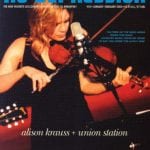Alison Krauss – The bluegrass rose blooms
It’s the summer of 1983, and it could be in Illinois or Indiana or Missouri. A brother and sister are making the festival rounds, playing the hits of the fiddle contest circuit: “Sally Johnson”, “Sally Gooden”, “Yellow Rose Waltz”, “Sop The Gravy”, “Dusty Miller”, and “Gardenia Waltz”, the young girl’s favorite tune. She is only 12 years old, but people take notice. She wins the Illinois State Fiddle Championship that year, and then wins best fiddler at the National Flatpicking Championships in Winfield, Kansas, the next year.
In 1985 she records an album with her brother called Different Strokes; the next year she is auditioning in front of Bela Fleck, Sam Bush and Jerry Douglas, and then signs with Rounder, the label that has been her home ever since, through platinum records and Grammy awards, and up to her career-spanning, double-disc Live set released in November. All the while, Alison Krauss has steadily been widening, ever widening, the audience for bluegrass and acoustic music.
She grew up fast, and though Alison Krauss never willed the international notoriety she has found, she wears it lightly, with some embarrassment, but with composure nonetheless. Born July 23, 1971, in Decatur, Illinois, Krauss grew up just to the east, in the college town of Champaign, the daughter of Fred and Louise Krauss, and the younger sister of Viktor. Her father was trained as a psychologist and then worked in real estate, while her mother worked as an illustrator. Her family remains, in some sense, Alison’s greatest influence.
“My parents took the job of having children and raising children very, very seriously,” she explains. “That wasn’t something my brother and I knew at the time, but asking them questions later on, we learned just how much they had talked about it before they had us, about how they would raise us.
“They wanted to make sure that if we had any ability, they would encourage it. We had everything: art classes, dance, swimming. They also suggested that we play an instrument for five years. When my brother was 5 he started the piano; when I was 5, two years later, I started the violin. We thought everybody’s family did that.
“It was probably an unrealistic thing for most people. It was a very positive, very encouraging childhood. I grew up very sheltered; you wouldn’t think that now, traveling around playing music. But I mean sheltered from really negative things. There was no trauma in my childhood.”
Krauss began classical violin lessons in grade school but quickly gravitated towards the speed, power and improvisation of old-time fiddle tunes. She quit classical training when she was 11. “I clearly wasn’t driven with my classical lessons,” she says. “I don’t know how driven I was with the fiddle tunes, either. But it was clear that that was what I enjoyed most. My mother played guitar and sang harmony, and she knew what she was doing. When I was going to learn fiddle tunes, she bought records, and she would make a tape of one tune, 30 times, over and over. She’d do that while I was at school and then give it to me. ‘I’ve heard, If you can sing it, you can play it,’ she’d say. ‘Just listen to it till you can play it.'”
Krauss has never stopped listening; in some sense, that’s her greatest gift. She is not a songwriter, she is a song catcher, as good as anyone in bluegrass (or country music, for that matter). From her first Rounder album, 1987’s Too Late To Cry, she has been finding songs that fuse melody and lyricism into a single emotional gesture, with an ear for economy and grace that allows her voice to mirror back emotions, the kind that run so deep you feel that voice must have been present in the heat of the song’s composition.
And yet for a woman who has done as much as anyone to popularize bluegrass, Krauss has never seen herself as a missionary. “I liked playing fiddle, but I wasn’t terribly driven,” she says of her teenage years. “It wasn’t something I wanted to do all the time. My mom at one point said, ‘We thought you had quit!’ And I never thought I’d get to do it for a living.
“I got obsessed with music when I got into bluegrass. The fiddle stuff was fun, but being in a band situation, singing harmonies, working out tunes, I really loved that. I couldn’t just sit and noodle all day. But I could sit and listen to records all day.”
Krauss opted for early admission to the University of Illinois in Champaign at 16, with the vague idea of pursuing a degree in musical education. “I didn’t finish high school, and then I didn’t finish college,” she says. “I don’t have anything, I don’t have any diploma from anything. I loved music appreciation and ear training; that was fun. But the rest of college, I just wasn’t motivated. I was just sleeping and thinking about Del McCoury records all day. My parents wanted me to stay in high school and college, but no one could tell me any different. In some respects I wish I would have stayed. There were a lot of relationships and experiences that I never really got to have.”




